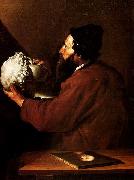Wholesale Oil Painting No Minimum |
|||||||||||
|
|
|||||||||||

|
|||||||||||
|
|
|
||||||||
Jose de RiberaSpanish Painter and Print engraver , 1591-1652 Information concerning the life and personality of Jusepe de Ribera is sparse. He was born the son of a shoemaker in Jetiva, Valencia Province. He appears to have gone to the city of Valencia while still a boy, but nothing is known of his possible artistic training there. As an adolescent, he traveled to Italy and spent time in Lombardy. Next he was in Parma, from which, it is said, he was driven by the contentious jealousy of local artists. He located himself in Rome until an accumulation of debts forced him to flee. Finally he settled in Naples, where in 1616 he married Caterina Azzolino, the daughter of a painter, by whom he had seven children between the years 1627 and 1636. The Academy of St. Luke in Rome elected Ribera to membership in 1625, and 6 years later the Pope conferred upon him the Order of Christ. It is understandably speculated that Ribera revisited Rome for these events. Being sought after in Naples by the Church and the various Spanish viceroys who ruled there in the name of the Spanish monarchy, he dismissed the idea of returning to his homeland. He was quoted as saying that he was honored and well paid in Naples and that Spain was a cruel stepmother to its own children and a compassionate mother to foreigners. Nevertheless, he generally added his nationality when he signed his works. This practice inspired the Italians to nickname him "the Little Spaniard" (Lo Spagnoletto). The last decade of Ribera's life was one of personal struggle. He suffered from failing health, the taunts of other artists that his fame was "extinct," and difficulty in collecting payments due him. Nevertheless, he kept it from being a tragic defeat by continuing to paint until the very year of his death in Naples. Actually, he was the victim of the local politics and finances. Naples was in the throes of a severe economic depression for which the foreign rulers, the patrons of Ribera, were naturally blamed, and the desperate citizenry was rioting in the streets. It is significant that Ribera continued to receive commissions in such a time, even if there was a dearth of payments. Ribera was inventive in subject matter, ranging through visionary spectacles, biblical themes, genre, portraits, mythological subjects, and portraits of ascetics and penitents. |
||||||||
|
|
||||||||
touch
touch Painting ID:: 71500 |
c. 1630
Oil on canvas
114 x 88 cm (44.88 x 34.65 in)
c. 1630 Oil on canvas 114 x 88 cm (44.88 x 34.65 in) |
|||||||
|
|
||||||||
|
REMBRANDT Harmenszoon van Rijn Born 1606, Died 1669.One of the great Dutch painters and printmakers of the 17th century, Rembrandt van Rijn is best known for his expressive use of light and shadow (also called chiaroscuro) in his many portraits. Raised in Leiden, he studied with Pieter Lastman (1583-1633) in Amsterdam, then returned to Leiden around 1625 and set up shop as a teacher and portrait artist. Sometime between 1630 and 1632 Rembrandt relocated to Amsterdam, where he spent the rest of his career. Though he had his detractors (some of whom considered him coarse and "low born"), Rembrandt was successful and famous during his lifetime, though he fell on financial hard times in his later years. He was a master printer and produced hundreds of group portraits and historical paintings, including The Anatomy Lesson of Dr. Tulp (1632), The Military Company of Captain Frans Banning Cocq (1642) and Aristotle with a Bust of Homer (1653). His portraits -- including a lifelong trail of intriguing and rather frank self-portraits -- reveal his interest in psychological study and continue to be admired as landmarks in Western art. The Military Company of Captain Frans Banning Cocq is also known as "The Night Watch" because it was thought the painting depicted a nighttime scene. When the painting was cleaned in the 1940s it became obvious that it depicted a daytime scene... He married Saskia van Ulenburgh (also Uylenburgh) in 1634. Touch 1624-1625 Medium oil on panel Dimensions 21.6 x 17.7 cm (8.5 x 7 in) cjr |
||||||||
|
|
||||||||
|
Prev Next
|
||||||||
|
|
||||||||
|
Related Paintings to REMBRANDT Harmenszoon van Rijn :. |
||||||||
|
|
||||||||
|
CONTACT US |

